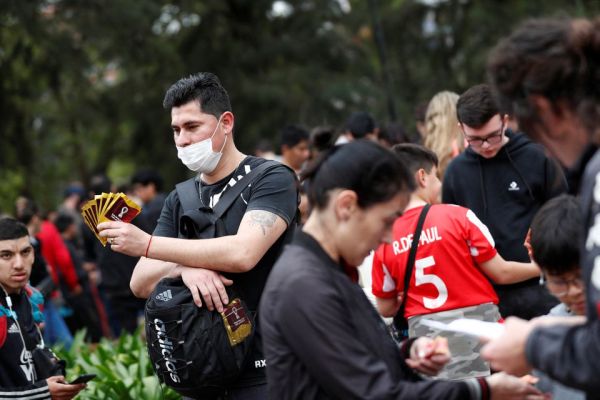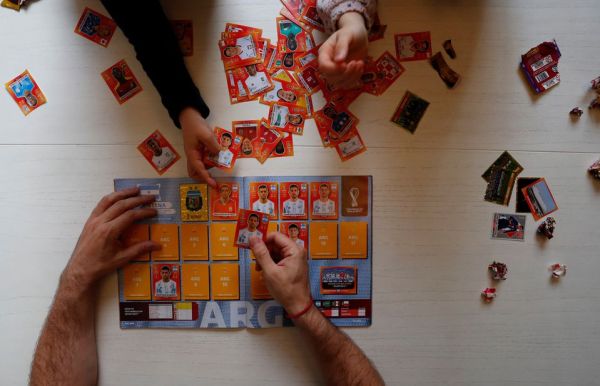Around two weeks ago, Argentina’s secretary of Commerce Matias Tombolini was forced to chair a meeting. It was set to be between executives and local shop owners. “The meeting has begun to assess the situation of the World Cup figuritas market,” Tombolini tweeted, offering to “make our legal and technical teams available to collaborate in the search for possible solutions.”
The shortage? Panini sports cards. The customers? An ever-growing line of Argentine parents, thronging sweet shops (the only places in Argentina authorised to sell these cards), hoping to buy the cards wholesale. And why would they want to buy these cards? Simply put, completing the Panini World Cup sticker album is a national obsession once every four years and demand has been fuelled by two major factors – an Argentine team that has struck a chord in the hearts of its people, and the jewel of that team saying that this is going to be his last World Cup.
People exchange soccer World Cup stickers at Parque Rivadavia in Buenos Aires, Argentina September 18, 2022. REUTERS/Agustin Marcarian
Panini cards, a venture of an Italian company that produces collectible cards across sports and has usually always found favour in the USA. America loves its collectibles and the resale market on the cards are only topped by the sneaker resale market in the territory. But Argentina has a rich history of collecting Panini cards as well. Before the 2018 World Cup, gunmen had managed to steal $360,000 worth of Panini cards in the Argentine town of Munro. Now, the demand for the cards has been fuelled by all time high hopes of a successful World Cup. At the age of 35, Lionel Messi and the Argentine football team are almost single-handedly pushing a collector’s market to buy up trading cards in an economy that is heading for 100% inflation this year.
A hopeful country
The 2018 World Cup in Russia was supposed to be the one. After Mario Goetze delivered some extra-time heartbreak at the Maracana in 2014, Russia was supposed to be Argentina’s redemption. It was supposed to be the redemption of a production line that had produced five U-20 World Cups 1995 and 2007. But most importantly, it was supposed to be the redemption of Lionel Messi and his record at international events.
But the World Cup came and went. Croatia happened. And Argentina’s finest footballing product had to go through what Michael Jordan possibly went through in the late eighties. Being the best player on the planet, in a team sport, doesn’t guarantee titles.
But then in 2021, something miraculous happened. Argentina’s senior team actually won a tournament. In the midst of the pandemic, federations banded together to host the Copa America. It was a tournament that was conducted under the guise of re-organising the CONMEBOL football calendar, but in actuality was to raise funds for these federations struggling with the impact of covid.
 A street seller offers soccer World Cup stickers for sale at Parque Rivadavia in Buenos Aires, Argentina September 18, 2022. REUTERS/Agustin Marcarian
A street seller offers soccer World Cup stickers for sale at Parque Rivadavia in Buenos Aires, Argentina September 18, 2022. REUTERS/Agustin Marcarian
In the final, Messi’s Argentina beat Brazil 1-0. A 27-year long title drought came to its finality. And the greatest talent Argentina had ever produced finally had his hands on some national silverware.
Albiceleste’s chances
Is it fair to put high hopes on Argentina’s chances in Qatar? Possibly not. The Nations League has ensured that in this World Cup cycle, teams that are not from Europe, rarely get an opportunity to face off against high-ranked European teams. International friendlies are a way to test your mettle and figure out where you stand.
Argentina are currently on a 34-game unbeaten streak. But look closer and the truth is a lot different. In the past three years, Argentina have faced European opposition only twice – a 5-0 drubbing of Estonia and then a 3-0 victory over Italy in the Copa Finalissima at the Wembley.
The lack of variety in their opposition, as well as the lack of quality is compounded by problems within the squad. Angel di Maria is not getting regular game-time at Juventus. Both right-back Gonzalo Montiel and left-back Marcos Acuna are not utilised regularly at their clubs. Mercifully, Gonzalo Higuain has retired and there will be no more repeats of missed chances as was the case in the 2014 World Cup Final, or the 2015 and 2016 Copa America finals, both against Chile.
 Lucas Perrone, 39, pastes soccer World Cup stickers with his kids in Buenos Aires, Argentina September 16, 2022. REUTERS/Agustin Marcarian
Lucas Perrone, 39, pastes soccer World Cup stickers with his kids in Buenos Aires, Argentina September 16, 2022. REUTERS/Agustin Marcarian
Despite there being plenty of reasons to not consider Argentina as title favourites, this edition of the World Cup might be a lot more open than previously believed.
Looking at the form of contending teams, one can’t help but think that the scheduling of the tournament might possibly be coinciding with a dip in form for top teams. Both England and France, with their deep squads have been hit with a string of draws, losses and unanswered questions lately. With a few weeks left for the biggest tournament in football, the gap between top teams is a lot smaller than previously imagined. Messi, no longer burdened by the wants of an international trophy, could very well make the difference between small lines at the World Cup. If his Panini card has value among the Argentines at present, imagine what the lines at the sweet shops in Buenos Aires would be like if the trading card with Messi holding the World Cup trophy was released.





